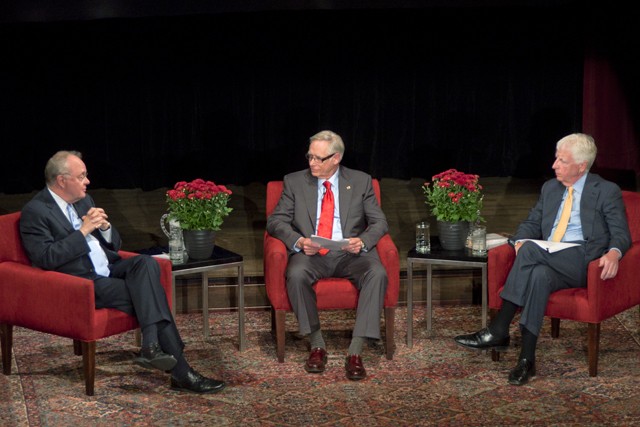On Thursday evening, two events held hours apart on the University of Minnesota West Bank campus offered different perspectives on the state of higher education and proposed solutions for the problems facing American universities.
At one event, University President Bob Bruininks was joined on stage by two administrators from top universities. They warned about the negative impacts of declining state aid, the increased competition from foreign universities and potential risks from increased research commercialization.
Earlier in the evening, University faculty, staff and students gathered for a “counter-event” because organizers felt BruininksâÄô discussion was one-sided and âÄî at $20 a ticket âÄî inaccessible to students.
The rebuttal event was organized by Faculty for the Renewal of Public Education (FRPE), a group of faculty members that formed to address problems they see in the UniversityâÄôs governance, and the Education Action Coalition.
“We thought we should include voices âĦ and get students involved,” said event organizer and political science professor Teri Caraway.
During BruininksâÄô event, author and former Columbia University provost Jonathan Cole spoke about the negative effects of declining state and federal funding for universities.
Cole described universities “as engines of innovation” that produce ideas and discoveries that shape the country and impact the economy.
“The FM radio, the laser, the algorithm for Google âĦ the basic ideas behind nanotechnology âÄî all of these things came out of research universities,” he said. “If we disinvest in them as we have begun to do, then I think the nationâÄôs welfare is literally at threat.”
However, Gary Rhoades, general secretary of the American Association of University Professors, who spoke at the rebuttal event, contested the notion that universities are lacking resources.
While state and federal funding has been decreasing, Rhoades said overall revenues have actually increased, making the large tuition hikes used to offset the loss of funding unnecessary.
“We are not in hard times compared to most of the American population,” Rhoades said.
Speakers at both events acknowledged that steep challenges face universities in the coming years and they agreed that solutions would have to come from within.
There is a general lack of transparency at universities, Rhoades said, and to find alternatives to the current revenue-driven policies, faculty need to call for an open discussion of finances and financial decisions.
Bruininks said preserving the quality of the University while keeping it accessible will take cooperation among the University community as well as with private businesses and the state government.
“ItâÄôs not just one personâÄôs responsibility or the responsibility of one single segment in our society,” Bruininks said in an interview after the event. “ItâÄôs going to take coordinated action in all of these areas, I think, to really advance the academic quality âĦ of the University of Minnesota in the future.”
Cole warned that threats, both internal and external, to academic freedom could also undermine universities. As the commercialization of research becomes a more important source of revenue, Cole warned there is the possibility for corruption if universities arenâÄôt “vigilant” about conflicts of interest.
Rhodes criticized the trend of commercialization as “academic capitalism” and said universities need to work on upholding their public responsibilities and look for sources of creative and imaginative ideas rather than focusing on revenue and rankings.
“ItâÄôs not a lack of aspiration, but a lack of imagination,” Rhoades said.
University student Sofia Shank said at the FRPE event there needs to be more involvement from students, faculty and staff in governing the University and the decisions that will affect its future.
“It is our responsibility to shape the future,” Rhoades said.
Bruininks agreed that the responsibility for the direction of the University lies with University community.
“I think the future is relatively bright,” he said, “but I donâÄôt think we can achieve a better future for the University of Minnesota without working together as an academic community.”


